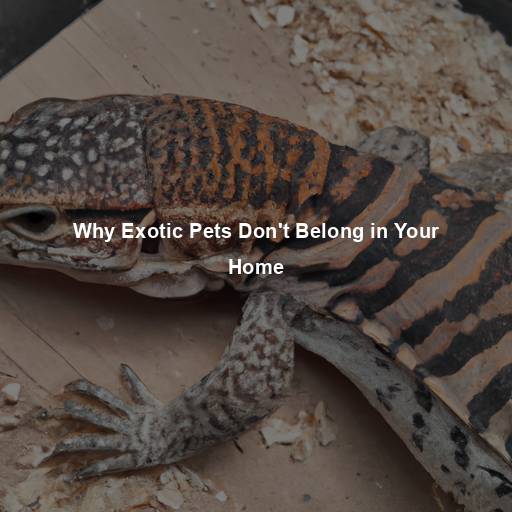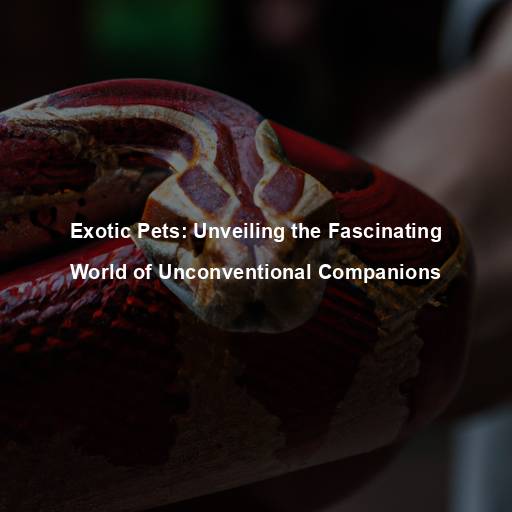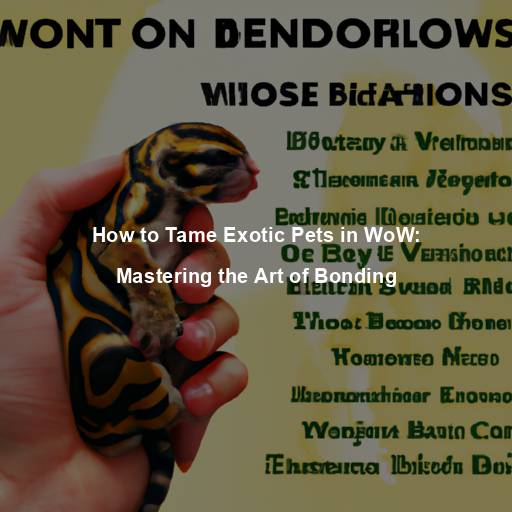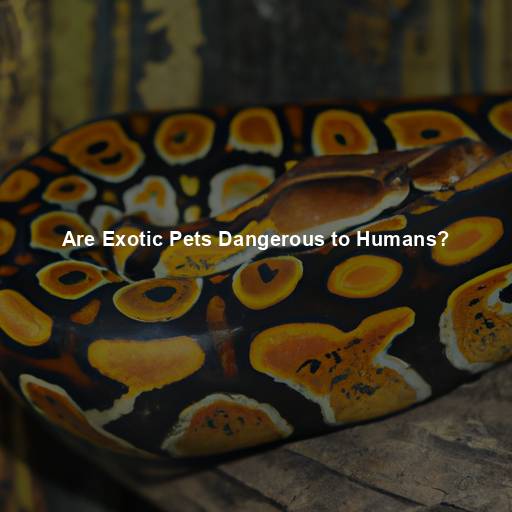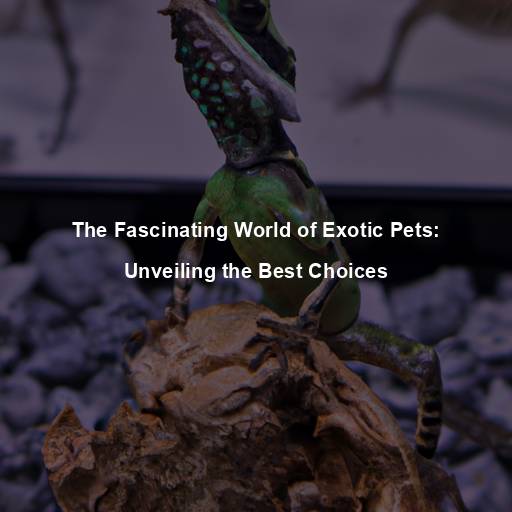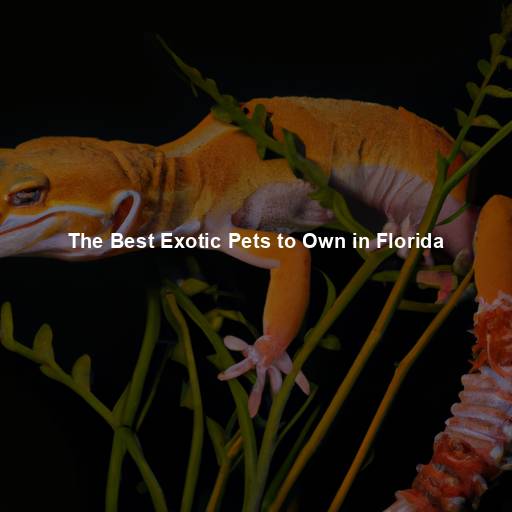Why Exotic Pets Don’t Belong in Your Home
Last Updated on July 22, 2023 by Evan
Contents
- 1 Understanding the Appeal of Exotic Pets
- 2 The Illusion of Domestication
- 3 The Impact on Conservation Efforts
- 4 Responsible Pet Ownership
- 5 The Myths and Realities of Exotic Pet Ownership
- 5.1 Myth: Exotic Pets Make Great Conversation Starters
- 5.2 Myth: Exotic Pets Are Low-Maintenance
- 5.3 Myth: Exotic Pets Can Be Trained to Behave Like Domesticated Animals
- 5.4 Reality: Exotic Pets Are Wild Animals
- 5.5 Reality: The Risks to Human Health and Safety
- 5.6 Reality: The Importance of Species-Specific Care
- 6 The Role of Legislation and Advocacy
- 7 FAQs: Why Exotic Pets Don’t Belong in Your Home
- 7.1 What are exotic pets?
- 7.2 Why shouldn’t I have an exotic pet in my home?
- 7.3 Are exotic pets dangerous?
- 7.4 Don’t exotic pets offer unique companionship?
- 7.5 What are the legal implications of owning an exotic pet?
- 7.6 Can exotic pets become invasive species?
- 7.7 Are there any ethical concerns in keeping exotic pets?
Understanding the Appeal of Exotic Pets
For centuries, the fascination with exotic pets has lured in the hearts of animal enthusiasts, offering a sense of curiosity in possessing a creature that sets itself apart from the ordinary. The allure of owning a rare and distinct companion is undeniably compelling. Yet, amid the tantalizing allure, lies a maze of ethical and practical complexities that one must navigate with utmost caution. It is imperative to unravel the moral implications and logistical realities that accompany the desire for an exotic pet.
The Dangers of the Exotic Pet Trade
One of the primary concerns surrounding exotic pets is the exotic pet trade itself. This industry often involves the capture and transportation of wild animals, leading to significant harm and suffering for the animals involved. Many exotic pets are taken from their natural habitats, disrupting ecosystems and contributing to the decline of vulnerable species.
The Complex Needs of Exotic Animals
Caring for exotic animals can be an enigmatic endeavor, as their distinctive and intricate needs often elude traditional domestic settings. These creatures are finely attuned to specific habitats, diets, and social dynamics that defy replication within the confines of a typical household. To confine an exotic animal to an ill-suited environment is to subject it to a conundrum of physiological distress, compromised well-being, and potential behavioral quandaries.
The Legal and Ethical Considerations
When it comes to owning exotic pets, there’s a whole jungle of legal and ethical considerations to navigate. Each country and region seems to have its own set of rules and regulations, leaving pet owners and animal lovers scratching their heads in bewilderment. This baffling lack of consistency not only breeds confusion but also creates opportunities for illegal activities and the unfortunate mistreatment of these extraordinary creatures.
The Illusion of Domestication
One common misconception about exotic pets is that they can be domesticated like traditional pets such as dogs and cats. Domestication is a complex process that occurs over generations, involving selective breeding for specific traits and behaviors. Exotic animals, even those bred in captivity, retain their natural instincts and behaviors, which can be challenging to manage in a home environment.
Wild Instincts and Inherent Dangers
Exotic animals possess wild instincts that are deeply ingrained and difficult to suppress. These instincts can manifest in aggressive behavior, territoriality, and a lack of adaptability to domestic routines. Even seemingly harmless exotic pets, such as certain species of monkeys or reptiles, can pose significant risks to both their owners and the public.
Zoonotic Diseases and Public Health Concerns
Exotic pets also pose a potential risk to public health. Many exotic animals, including primates, reptiles, and certain birds, can carry zoonotic diseases that can be transmitted to humans. These diseases, such as salmonellosis or herpes B virus, can have severe consequences and may even be life-threatening. The close contact between exotic pets and their owners increases the likelihood of transmission.
The Impact on Conservation Efforts
The desire for unusual companionship can unknowingly sow the seeds of destruction for our planet. Beneath the surface of our fascination with exotic pets lies a web of consequences. The hunt and trafficking of these rare creatures unknowingly push endangered species further towards the brink of extinction and ravage the delicate ecosystems they call home. So let us reflect upon the true cost of our cravings, for in our pursuit of the extraordinary, we may inadvertently unravel the very fabric of nature’s tapestry.
Supporting Conservation in Other Ways
In a world where exotic pets may seem like a tempting choice, it’s important to pause and reflect on the bigger picture. Instead of indulging in the allure of having a unique companion, consider the profound impact that can be made by supporting conservation organizations and initiatives. By dedicating our time, resources, or funds to these reputable groups, we can contribute to the preservation of endangered species and their habitats, safeguarding their existence for generations to come, and fostering a deep appreciation and admiration for the wonders of the natural world.
Responsible Pet Ownership
Owning an exotic pet may seem tempting, but let’s face it, not every household is equipped to handle the unexpected quirkiness that comes with them. Thankfully, there is a vast array of delightful companion animals that are more than willing to fill our lives with joy and companionship. Dogs, cats, cuddly small mammals, and even feathered friends have been bred over the years to be the epitome of domestic bliss. They come with a rulebook that’s been written over centuries, making it easier for us to ensure their happiness and the unbreakable bond they form with us perplexed humans.
Adopt, Don’t Shop
When it comes to welcoming a furry friend into your home, nothing beats the fulfilling experience of adoption. Animal shelters and rescue centers brim with a kaleidoscope of lovable, eager creatures awaiting their forever abode. By choosing to adopt, you not only grant a fresh start to a deserving soul but also play a vital role in dismantling the machinations of unscrupulous puppy mills and thoughtless breeders. So why not embark on this heartfelt journey and witness the transformative power of compassion firsthand?
Responsible Pet Care
When it comes to having a furry companion, being a responsible pet parent means diving headfirst into a whirlpool of care, from dishing out the right nourishment to giving them the social connections they crave. From understanding their unique needs to setting up a cozy habitat that’s tailor-made for their jollity, it’s a journey filled with perplexing decisions. Embracing the role of a pet parent means entering a lifelong commitment, one that demands unwavering dedication and a heart full of love.
The Dark Side of the Exotic Pet Industry
In the fascinating world of the pet trade, a multi-billion dollar industry that transcends borders, a perplexing truth emerges. Amidst the allure of owning exotic creatures, a tale of burstiness and uncertainty unfolds. The buying, selling, and trading of these rare animals pulsates with potential, but beneath the surface lies a shadowy realm of cruelty, illegalities, and the exploitation of fragile species. This enigma unravels in tragic ways, as these extraordinary creatures are subjected to inhumane conditions, enduring untold suffering and tragic loss in their journey from captivity to commerce.
The Impact on Wildlife Populations
The demand for exotic pets fuels the unsustainable and often illegal capture of animals from their natural habitats. This practice has devastating consequences for wildlife populations. Species that are already threatened or endangered are pushed further towards extinction due to habitat destruction and overexploitation. The loss of these species has far-reaching ecological ramifications, disrupting delicate ecosystems and compromising biodiversity.
The Role of Supply and Demand
In the fascinating world of the exotic pet trade, an intricate dance takes place between those who crave the extraordinary and those who supply it. How could one resist the allure of owning a rare creature, even if it means supporting a questionable industry? It is a complex and perplexing situation, one that forces us to confront the ethical quandaries surrounding animal welfare and conservation. As consumers, we hold the power to shape the future of this trade, and with that power comes the responsibility to make informed and conscientious choices.
The Ethical Considerations of Exotic Pet Ownership
The allure of owning an exotic pet is undeniable, but beneath the surface lies a complex web of ethical dilemmas that surpass mere concern for the individual animal’s welfare. The ownership of these captivating creatures forces us to confront broader moral considerations that leave us puzzled and conflicted. As we navigate this treacherous terrain, we must grapple with the perplexing question of whether our desire for exotic pets outweighs the potential harm inflicted upon these animals and their ecosystems.
Conservation and Preservation
Preserving the intricate harmony of our planet’s ecosystems heavily hinges upon the protection of wildlife and their habitats. Disturbing this intricate balance by plucking animals from their natural abodes to cater to our whims as pets only adds to the vulnerability of already imperiled species. Rather than exacerbating the plight of wildlife, let us rally behind conservation initiatives and shield the sanctity of their natural havens.
Animal Welfare and Quality of Life
In the captivating world of exotic animals, intricately adapted to their specific habitats, lies a profound perplexity: these magnificent creatures flourish in realms that simply defy re-creation within the confines of domesticity. The enigma in keeping them as pets lies in the constrictions and limits imposed upon their once boundless movements, often resulting in profound physical and psychological disquietude for our cherished companions. Despite our utmost dedication and care, the unyielding task of providing an environment that unconditionally satisfies their intricate requirements remains an ongoing challenge, veiled in a veil of obscurity.
Human Responsibility and Duty of Care
As humans, we have a responsibility to treat animals with respect and compassion. Owning an exotic pet is a significant undertaking that requires specialized knowledge, resources, and a commitment to meeting the animal’s unique needs. Failing to provide proper care and enrichment can lead to a life of suffering for the animal and potentially endanger the well-being of the owner and the public.
The Myths and Realities of Exotic Pet Ownership
Myth: Exotic Pets Make Great Conversation Starters
There is a rather puzzling belief floating around that exotic pets are the ultimate icebreakers, the perfect statement pieces that elevate one’s social standing. While it cannot be denied that these uncommon creatures can ignite intrigue and capture attention, it is imperative to unravel the ethical complexities surrounding their ownership. We mustn’t reduce these living beings to mere objects of amusement; instead, we need to appreciate and honor them for their intrinsic worth, independent of human desires.
Myth: Exotic Pets Are Low-Maintenance
Contrary to popular belief, one common misconception about exotic pets is that they are effortless to care for, requiring minimal time and effort compared to traditional pets. However, the truth is quite the opposite. The intricacies involved in looking after these unique creatures, from their specific dietary requirements to their complex environmental needs and potential health concerns, can be overwhelmingly demanding. It’s crucial to recognize that successfully taking care of exotic animals often necessitates specialized knowledge and access to resources that may surpass the capabilities of most pet owners.
Myth: Exotic Pets Can Be Trained to Behave Like Domesticated Animals
There’s a debate swirling around regarding the plausibility of taming exotic animals to mimic the behavior of domesticated ones through socialization and training. While proponents argue that some may indeed display traits akin to those fluffy pets we’re familiar with, it’s crucial to tread carefully. Let’s not forget, these majestic creatures are wild souls with untamed instincts and distinct requirements. Imposing upon them the expectations of behaving like their domestic counterparts might just unleash a torrent of frustration, stress, and even aggression.
Reality: Exotic Pets Are Wild Animals
The reality is that exotic pets are wild animals, regardless of whether they were bred in captivity or taken from the wild. They retain their natural instincts, behaviors, and needs, which are often challenging to meet in a home environment. It is unfair and unrealistic to expect these animals to conform to our expectations of what a pet should be.
Reality: The Risks to Human Health and Safety
Exotic pets, by nature, can pose risks to human health and safety. Their wild instincts, strength, and potential for aggression can result in serious injuries or even fatalities. Furthermore, as carriers of zoonotic diseases, exotic pets can transmit pathogens to humans, causing illness and potentially triggering public health crises.
Reality: The Importance of Species-Specific Care
Each species of exotic animal has unique care requirements that must be met for their well-being. From temperature and humidity levels to dietary needs and social structures, providing appropriate care for exotic pets can be incredibly challenging. Without the necessary knowledge and resources, it is difficult to ensure that these animals can thrive in a captive environment.
The Role of Legislation and Advocacy
The Need for Stronger Legislation
Given the ethical and practical concerns associated with exotic pet ownership, many countries have implemented legislation to regulate or ban the ownership of certain species. These laws aim to protect both the welfare of animals and public safety. However, there is still a need for stronger and more comprehensive legislation worldwide to address the complexities of the exotic pet trade and ensure the well-being of animals.
Raising Awareness and Promoting Responsible Choices
In addition to legislation, raising awareness about the issues surrounding exotic pets is crucial. Education and advocacy can help dispel myths, challenge misconceptions, and encourage individuals to make responsible choices when it comes to pet ownership. By promoting the welfare of animals and the preservation of wildlife, we can collectively work towards a more compassionate and sustainable future.
Supporting Organizations and Initiatives
In this chaotic and ever-changing world, it’s a perplexing task to navigate the realm of exotic animals and their fragile habitats. However, fear not! There exists a multitude of organizations and initiatives that tirelessly strive to protect these enigmatic creatures and the ecosystems they call home. By lending support through donations, volunteering, or simply spreading the word, we can embrace our burst of power to safeguard these precious beings and preserve the intricate tapestry of biodiversity.
FAQs: Why Exotic Pets Don’t Belong in Your Home
What are exotic pets?
Have you ever wondered about the captivating world of exotic pets? These extraordinary creatures ignite a sense of wonder, unearthing a world beyond the ordinary. From the slithering reptiles to the enchanting amphibians, the exalted exotic birds to the pint-sized mammals, their allure is undeniable. Yet, treading into their domain is no small feat, for their beguiling demands for a tailored diet, a particular environment, and even companionship can leave even the most seasoned pet owners in a state of perplexity.
Why shouldn’t I have an exotic pet in my home?
There are several reasons why exotic pets may not be suitable for your home. Firstly, most exotic pets have complex care requirements. They often need specialized diets, specific environmental conditions (like humidity and temperature), and proper socialization. Meeting these needs can be both time-consuming and expensive. Moreover, exotic pets often require a significant amount of space to thrive, and providing them with adequate living arrangements can be a challenge for many households.
Are exotic pets dangerous?
Owning exotic pets may seem enticing, but let’s unravel the entangled truth behind their allure. These enchanting creatures, with their captivating charm, can unveil a precarious side, posing an enigma as to whether they truly belong in domestic settings. Beware the hidden perils that lay beyond their mesmerizing facade – a dazzling coat hiding lurking diseases, an unpredictable disposition hiding beneath their exotic allure, and unexpected harm hiding around every corner. Before plunging into the abyss of this unconventional pet world, it’s crucial to navigate the complexities that come with harboring such enigmatic beings in our homes.
Don’t exotic pets offer unique companionship?
The allure of owning a fascinating exotic pet may be tempting, but one must pause for a moment and ponder the repercussions for these creatures. These unusual species boast intricate social hierarchies and innate instincts that can never truly be sated within the confines of home. The strain of existence in an alien environment, constrained by finite outlets for their innate behaviors, can foster enduring health ailments and a plethora of behavioral quandaries within these magnificent beings. In light of this, it becomes imperative to champion the animal’s well-being and endorse conservation endeavors in their authentic habitats, rather than reducing them to mere household companions.
What are the legal implications of owning an exotic pet?
The mesmerizing world of exotic pets is a complicated labyrinth, with the regulations governing their ownership dancing in a perplexing tango of jurisdictional disparities. Across various places, the ownership of certain bewitching species requires more than just a whimsical desire; it demands the acquirement of special permits or licenses. Such stringent measures are designed to protect not only the captivating creatures themselves but also the innocent public who might unknowingly sway into their path. Ignorance of these enigmatic laws can lead to a whirlwind of troubles, including heavy fines, the confiscation of these spellbinding beings, or even the looming shadows of criminal charges. Therefore, embarking on the enthralling journey of embracing an exotic pet necessitates a thorough endeavor into the beguiling world of legal requirements and an unwavering commitment to understanding its bewildering intricacies.
Can exotic pets become invasive species?
Have you ever considered the impact of exotic pets on our delicate ecosystems? It’s a topic that begs us to pause and ponder the perplexities of our actions. These fascinating creatures, once released or escaped, have the potential to disrupt the harmony of nature. With their alien presence, they can wreak havoc on local wildlife populations, throwing our delicate balance of biodiversity into disarray. As responsible individuals, we must take action to prevent this intrusion, ensuring the preservation of our precious ecosystems.
Are there any ethical concerns in keeping exotic pets?
The ethical complexities surrounding the ownership of exotic pets are nothing short of mind-boggling. These captivating creatures, plucked from their natural habitats without a second thought, find themselves navigating a treacherous world of illegal wildlife trade. It’s a perplexing situation, to say the least, as even those bred in captivity can face questionable conditions and practices that leave their welfare hanging in the balance. When contemplating the bigger picture, it becomes paramount to embrace ethical alternatives that champion responsible ecotourism and conservation efforts. By safeguarding these majestic beings in their natural environments, we can unravel the enigma of their existence and ensure their preservation for generations to come.
Remember, owning an exotic pet is a significant commitment that should not be taken lightly. It is crucial to thoroughly research and understand the specific needs and challenges associated with the species you are interested in before making a decision.

